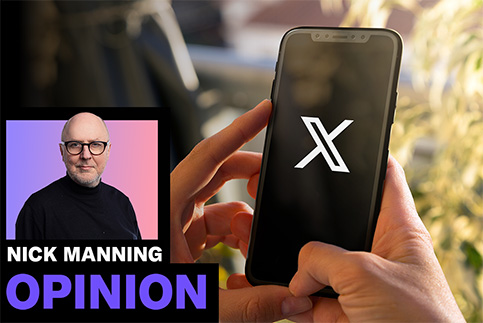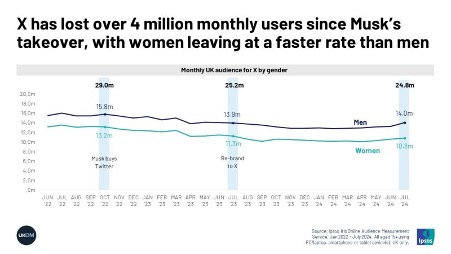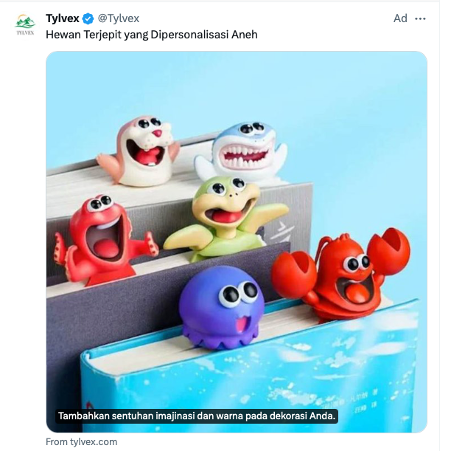Elon Musk has done the world a favour — but not the one he intended

Opinion
Elon Musk’s GARM lawsuit has highlighted why brands should support responsible media that provide a benign advertising environment, an engaged audience and a measurable return on investment.
The debate over the responsibility of social platforms for the content they publish has reignited this summer, with developments seemingly by the day.
In August, the arrest in France of the founder of Telegram has set off the predictable anguish over the potential threat to free speech, with Elon Musk naturally defending a fellow billionaire of the right to unfiltered expression, supposedly within the law (although in Telegram’s case, it’s not possible to make this claim).
Musk himself is locked in battle with the Brazilian authorities and X may be banned there, while a US court has ruled sympathetically on a lawsuit that implicates TikTok in the death of a 10-year-old girl on the basis that its algorithms contributed to her death — a potential landmark.
In fact, Musk has had war on his mind a lot lately. He’s predicted civil war in the UK and declared war on advertisers that don’t use X. He’s a vigorous combatant in the “culture wars”, where everyone loses.
I wonder if “war” will feature again in his remarks if his chosen candidate for the US presidency doesn’t get chosen by the electorate. Let’s hope not, as his army of acolytes seem to take what he says both literally and seriously, and they have form.
In democracies, free speech has always been respected. For example, the US first amendment protects this, but there have been laws and generally observed societal norms in place everywhere for centuries to protect society from its worst excesses. There has never been any licence for free speech absolutism.
Musk says that only legality should prevail, so anything that is highly inflammatory but not illegal is deemed acceptable on X, even if it leads indirectly to violence or other harm or is otherwise anti-social.
X may be seen by Musk as the “town square”, but people in towns who espouse the kind of opinions that get expressed on X these days either have their collars felt or rightly get ostracised by the locals. Try that in a Liverpool pub.
The need for independent media
There is a good reason why most democracies (excluding the US) have independent and often public-service media that are held responsible for their output (not just its legality) and which are regulated.
The existence of Ofcom in the UK is a good example of the need to oversee media content and prevent extremism or content that could otherwise mislead or inflame.
Truth and accuracy matter in media, especially in news and current affairs. Strong democracies have enjoyed the benefits of free, independent, reliable and regulated media for centuries.
X is a brilliant example of what happens when the established and proven order breaks down and the floodgates are opened to a deluge of opinion, prejudice, grudges, axe-grinding, scams, porn, political opportunism and plain greed. All of it permissible, apparently, in the name of free speech.
It’s complicated, but for the definitive word on the responsibility of the owners of tech platforms, look no further than this column by Alan Rusbridger in Prospect.
What matters to advertisers
But’s let’s examine this further from the advertiser angle.
I didn’t want to add to the comment tsunami that followed Musk’s lawsuit against named advertisers and the Global Alliance for Responsible Media (GARM), but I haven’t seen it reported elsewhere that we should actually be grateful to Musk and his lieutenant, Linda Yaccarino (who has found out how much a soul costs, not what it is worth).
And I am not talking about Yaccarino’s “hostage video”, which gave us the most accidental laughs of the year. The original was risible enough, but was trumped by the Late Show spoof.
By taking the action he has, Musk and Yaccarino have reminded us of what really matters in media and especially for advertisers.
The many contradictions in Musk’s approach were on full display in Musk’s Cannes interview with Mark Read.
Musk accused advertisers of trying to “censor” X and colluding to force it to change its content. I doubt anyone agrees with this, unless a large pay cheque relies on it.
In Cannes, Musk stated that advertisers have freedom of choice, just as people can choose to use X or not. Advertisers have exercised their freedom and not just because Musk told them to “go fuck” themselves. And certainly not because a trade body has supposedly organised a mythical boycott.
Advertisers don’t do or need to do this sort of thing individually or collectively, and the assertion that they do simply demonstrates how ignorant Musk is about the advertising industry. I’m not sure Yaccarino can be similarly exonerated.
Unproven conspiracy
By any normal measure, Musk is wrong to bully GARM. He’s a gazillionaire and GARM a well-meaning non-profit. The advertiser trade associations can’t and don’t organise concert parties; not only would it be a breach of their charter duties, it would lead to a loss of trust and credibility among their members.
Leaving aside the obvious folly of suing your own customers, it is simply wrong to break the metaphorical butterfly on a wheel on the basis of some unproven conspiracy, co-opting Congress along the way.
Among the many wrongs surrounding X, the article in the New York Post that described GARM’s Rob Rakowitz as a “fascist creep” is beyond contempt. If nothing else, this article shone a light on the character of the kind of people who think like Musk.
There has been a lot of talk about “brand safety” issues on X and I have always found this surprising, given that there are many reasons to not use X that render brand safety irrelevant.
By any measure, X does not stack up as an attractive place to advertise.
Plunge in ad revenue
Musk took over the company in October 2022 and normally you might expect a new owner to improve something that he spent $44bn on and which relies on ad revenue and the goodwill of advertisers.
But, in every respect, X has got worse. Let’s not even bother to talk about the rebrand.
It has reportedly lost 32m users since it was taken over and its UK performance has been lamentable.

The departure of women is especially damaging, leaving X with a 66% male audience — much less balanced than Facebook and Instagram.
Overall, it’s the 12th most popular social media platform in the world — hardly a triumph.
Any growth has come from Japan (its second-largest market after the US) and India. So unless you’re after such an internationalised audience, this growth is of little use.
It has also been flooded with bots; I have had many connection requests that are obviously not human and it is open season for hackers, fraudsters and others of bad intent. So any audience data directly from X has to be treated with extreme caution. The real figures are not going to be better.
X’s advertising revenue has plummeted, from circa $4bn in 2022 to an estimated $2.5bn this year.
Bizarre advertising
There has been no meaningful development of new advertising properties or formats and the quality of the advertising is bizarre. This example below is from my feed. And if anyone can explain what I’m being shown and why, there is a star prize.
And if anyone can explain why any self-respecting brand would want to be seen in the company of such advertising, there’s an even bigger reward.

In his Cannes interview, Musk described how X has improved its personalisation of advertising, describing untargeted ads as “spam” and leaving users regretful at seeing ads if they are not relevant.
Just how targeted X is can be judged from another ad in my feed that was presented to me on the off chance that, if I bought a Vauxhall car in a particular way up to 17 years ago, I may be owed “thousands” and I may be exercised enough to care.

And just in case I need an armoured car…

Among many comic moments during the Musk/Read exchange, Musk said X is the only place to reach people like himself, Michael Dell, Marc Andreessen and other international leaders. So the next time you want to reach Narendra Modi or some billionaire tech bros with your fabric conditioner ad, you know where to go.
Brand safety isn’t an issue if advertisers don’t use X for normal good reasons.
Musk claims that there has been an advertiser boycott, orchestrated by GARM. No doubt brand safety has been uppermost in advertisers’ minds in such an uncontrolled, chaotic platform where anything goes, but there are many other good reasons not to take the risk.
High-quality ad environment
However, the biggest favour that Musk has bestowed upon the world is that advertisers are increasingly aware of their role in funding high-quality media in which to advertise.
They are more aware than ever that adspend matters and where it is spent makes a difference. The public benefits from high-quality, professionally produced content that informs, entertains and educates; where truth matters and societal good is fostered.
Good content costs money, but pays back many times over in creating content that people benefit from.
Advertisers should support high-quality, reliable, responsible media that provide a benign advertising environment, an engaged and appropriate audience in both scale and profile, and an effective, measurable return on investment.
This should apply to all media, not just social, but it goes without saying that social media is the least reliable when it comes to any of the above criteria, including reliable measurement and the presence of automated traffic.
Many advertisers don’t care about some of this and use social media as a profitable driver of sales. This is perfectly normal, but for brands that really do care, responsible investment can produce the holy trinity of high attention, responsiveness and the perpetuation of high-quality media.
More than X
Finally, there is one unfortunate aspect to the blizzard of coverage of the Twitterstorm. It has masked far more substantial news, including from the Department of Justice’s review of Google’s practices.
This year, Google’s paid search revenue alone will reach $200bn, compared with X’s £2.5bn, and yet the focus has been on the latter.
Where advertisers spend their money has never mattered more, especially if they care about the truth, a harmonious society and a healthy media ecosystem.
And if you also care about this kind of thing, join as at Advertising: Who Cares? on 12 September in London.
 Nick Manning is the co-founder of Manning Gottlieb Media (now MG OMD) and was chief strategy officer at Ebiquity for over a decade. He now owns a mentoring business, Encyclomedia, offering strategic advice to companies in the media and advertising industry, and is non-executive chair of Media Marketing Compliance. He writes for The Media Leader each month.
Nick Manning is the co-founder of Manning Gottlieb Media (now MG OMD) and was chief strategy officer at Ebiquity for over a decade. He now owns a mentoring business, Encyclomedia, offering strategic advice to companies in the media and advertising industry, and is non-executive chair of Media Marketing Compliance. He writes for The Media Leader each month.




